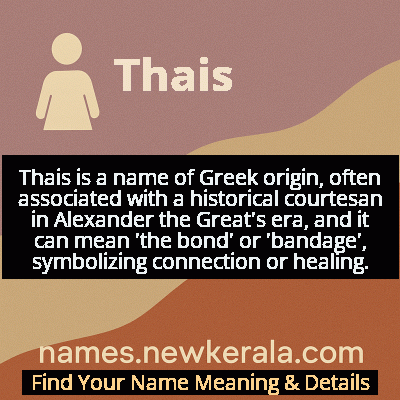Thais Name Meaning & Details
Origin, Popularity, Numerology Analysis & Name Meaning of Thais
Discover the origin, meaning, and cultural significance of the name THAIS. Delve into its historical roots and explore the lasting impact it has had on communities and traditions.
Name
Thais
Gender
Female
Origin
Greek
Lucky Number
3
Meaning of the Name - Thais
Thais is a name of Greek origin, often associated with a historical courtesan in Alexander the Great's era, and it can mean 'the bond' or 'bandage', symbolizing connection or healing.
Thais - Complete Numerology Analysis
Your Numerology Number
Based on Pythagorean Numerology System
Ruling Planet
Jupiter
Positive Nature
Optimistic, inspirational, and creative.
Negative Traits
Scattered, exaggerating.
Lucky Colours
Yellow, gold, purple.
Lucky Days
Thursday.
Lucky Stones
Yellow sapphire.
Harmony Numbers
1, 2, 9.
Best Suited Professions
Arts, writing, communication.
What People Like About You
Creativity, optimism.
Famous People Named Thais
Thaïs of Athens
Hetaera and Companion
Renowned Athenian courtesan and companion to Alexander the Great, known for her intelligence and influence
Saint Thaïs
Christian Saint
Egyptian courtesan who converted to Christianity and became a desert ascetic, later canonized
Thaïs Gulin
Brazilian Volleyball Player
Professional volleyball player who competed in the 2016 Summer Olympics
Thaïs de Andrade
Brazilian Actress
Notable Brazilian television and film actress known for her roles in popular telenovelas
Name Variations & International Equivalents
Click on blue names to explore their detailed meanings. Gray names with will be available soon.
Cultural & Historical Significance
The transformation of Saint Thaïs from courtesan to ascetic in 4th century Egypt illustrates the Christian theme of redemption and spiritual rebirth, making her story a powerful narrative in early Christian literature that influenced medieval hagiography. Her legend, particularly as dramatized in Massenet's opera and Anatole France's novel, became a cultural touchstone for discussions about sin, redemption, and feminine spirituality. In modern times, the name maintains its artistic and cultural connections, particularly in Latin American countries where it remains popular, often associated with beauty, intelligence, and strong character—qualities that bridge its ancient origins with contemporary values.
Extended Personality Analysis
Individuals named Thais are often perceived as charismatic, emotionally intelligent, and possessing natural leadership qualities. They tend to be socially adept with an innate ability to connect with diverse people, making them excellent communicators and mediators. Their name's meaning of 'beloved' often manifests in their relationships—they form deep, meaningful connections and are fiercely loyal to those they care about. Many Thais exhibit artistic sensibilities and creative talents, whether in visual arts, performance, or writing, often using these gifts to express complex emotional landscapes.
Thais typically possess strong intuition and emotional depth, allowing them to navigate complex social situations with remarkable grace and diplomacy. While they can be passionate and determined in pursuing their goals, they also demonstrate remarkable adaptability and resilience when facing challenges. Their combination of social intelligence and inner strength often makes them natural influencers in their personal and professional circles. The historical legacy of the name seems to imbue modern bearers with a sense of purpose and the ability to transform themselves and their circumstances, much like their namesake saint. They often display a unique blend of worldly sophistication and spiritual depth that makes them compelling figures in any social context.
Modern Usage & Popularity
In contemporary naming practices, Thais maintains moderate popularity with distinct regional variations that reflect its international appeal. The name enjoys consistent usage in Brazil and Portugal, where it ranks among the top 200 names for girls and is often spelled as 'Taís.' In French-speaking countries, particularly France and Quebec, it maintains classical appeal as a sophisticated choice with historical depth, preferred by parents seeking names with cultural resonance beyond mere trendiness. English-speaking countries show more sporadic usage, often favored by parents seeking unique names with classical roots and international flair, particularly among families with Greek heritage or classical education backgrounds. The name's popularity has remained relatively stable over recent decades, experiencing slight increases during periods when classical names trend upward. Modern parents choosing Thais often appreciate its combination of historical significance, melodic sound, and cross-cultural accessibility, making it an excellent choice for families valuing both tradition and global citizenship.
Symbolic & Spiritual Meanings
Symbolically, Thais represents a profound narrative of transformation, redemption, and the enduring power of feminine intelligence. The dual historical figures associated with the name—the sophisticated Athenian companion to Alexander and the redeemed saint of the Egyptian desert—create a powerful symbolic arc representing the human journey from worldly engagement to spiritual enlightenment. This duality makes the name emblematic of personal evolution and the capacity for profound self-realization. In metaphorical terms, Thais represents the integration of intellect and emotion, worldly experience and spiritual depth, suggesting that true wisdom comes from embracing all aspects of human experience. The name carries connotations of beauty that transcends physical appearance, pointing instead to inner grace, wisdom, and the ability to influence others positively through character rather than coercion. It symbolizes the idea that being truly 'beloved' emerges from inner worth and authentic connection rather than external validation. The name's endurance across millennia speaks to its representation of timeless feminine qualities—strength that embraces vulnerability, intelligence that values wisdom, and beauty that recognizes the sacred in the human journey.

